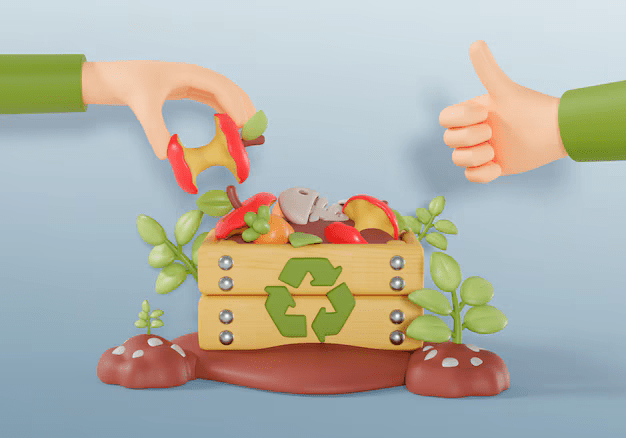Food waste has evolved into one of the most acute issues confronting the world today. Every year, millions of tons of fare are debilitated, bestowing transnational need, environmental degradation, and economic loss. Attacking this crisis requires a cooperative effort, and food garbage lessening has arisen as a paramount strategy for confirming food safety, diminishing environmental impact, and promoting sustainability.
The Scale of the Crisis
Eats waste is a transnational issue with far-reaching effects. According to the Food and Agriculture Organization (FAO), approximately one-third of all food cultivated for human consumption is smashed yearly. This amounts to roughly 1.3 billion tons of fare, worth about $1 trillion. Thus, fair waste removal has become a critical need for both developed and developing nations.
In conceived countries, much of the food waste occurs at the consumer and retail levels. In contrast, in developing polities, the crisis is more prevailing during the production, handling, and depository stages. Regardless of where it ensues, food waste reduction is essential to depriving its environmental and financial impact.
Why Food Waste Reduction Matters
The environmental cost of edible waste is staggering. When food is pitched, not only is the food totaled, but all the aids that go into farming, processing, and hauling it are also wasted. This retains water, fuel, and labor. Moreover, spoiling food in garbage yards emits methane, a potent conservatory gas that contributes to climate change. Food trash lessening is, thus, a paramount step in reducing the environmental footmark of the international food system.

Food waste disposal also plays a consequential role in handling global hunger. While millions of people go peckish every day, vast doses of edible food are thrown away. By executing food waste reduction strategies, we can redirect leftover food to those in demand, helping to rid hunger and food insecurity.
Strategies for Food Waste Reduction
To dive into the issue of food waste, nations, businesses, and individuals must embrace efficacious food waste removal strategies. These strategies can be enforced at various steps of the food supply chain, from production to consumption.
- Improved Supply Chain Management: A key food waste-lessening method involves better managing of the food supply chain. This includes reducing inefficiencies in food exhibition, processing, and distribution. Enhanced forecasting and inventory management can help shopkeepers and suppliers avoid overproduction and overstocking, guiding to less food waste.
- Food Recovery Programs: Food retrieval agendas strive to redirect leftover food that would otherwise be smashed to those who require it. These agendas involve partnerships between food producers, retailers, and generous alliances. By bestowing excess food, firms can contribute to food waste reduction while helping to battle hunger.
- Consumer Education: Educating patrons about the extent of food waste reduction is indispensable. Simple shiftings like planning meals, purchasing only what is required, and suitably storing food can seriously reduce household food waste. Grasp campaigns and endeavors that foster food waste reduction can encourage consumers to make more sufferable choices.
- Composting and Food Recycling: Composting organic waste is another efficacious food waste-lessing method. Rather than sending food waste to landfills, composting converts food scraps into helpful nutrients for the soil. This not only diminishes landfill waste but also enables improved soil health and diminishes the need for chemical fertilizers.
- Government Policies and Initiatives: Nations can play a significant role in fostering food waste deduction through approaches and codes. For example, food waste-lessening targets, tax stimuli for food donations, and initiatives to reduce food waste in public associations like schools and infirmaries can make a noteworthy impact.
The Role of Technology in Food Waste Reduction
Specialized innovations are also recreating an increasingly important role in food litter reduction. Smart technologies, such as apps that help consumers track cessation dates and collect their food merchandise, are entrusting individuals to decline waste at home. Likewise, artificial intelligence (AI) and appliance learning are being used by vendors and manufacturers to optimize food production and issuance, assuring that less food goes to obliteration.
Food waste reduction technologies are helping corporations streamline their procedures, reduce costs, and minimize their environmental mark. These inventions exhibit the potential of technology to revolutionize food waste reduction efforts on a global scale.
Judgment
Food waste reduction is not just a moral imperative but also a necessity for ensuring a sustainable future. The environmental, economic, and social outlay of food waste are too lofty to ignore. By enforcing effective food waste reduction plans, we can minimize waste, rescue the environment, and provide more people. From unique actions like mindful consumption to larger-scale measures such as policy reform and specialized innovation, every step toward food waste reduction is a step toward a more sustainable world. Now more than ever, food waste lessening must be at the fore of global efforts to create a more unbiased and sufferable food system. Together, we can make a difference. Let’s earmark to food litter reduction today!







